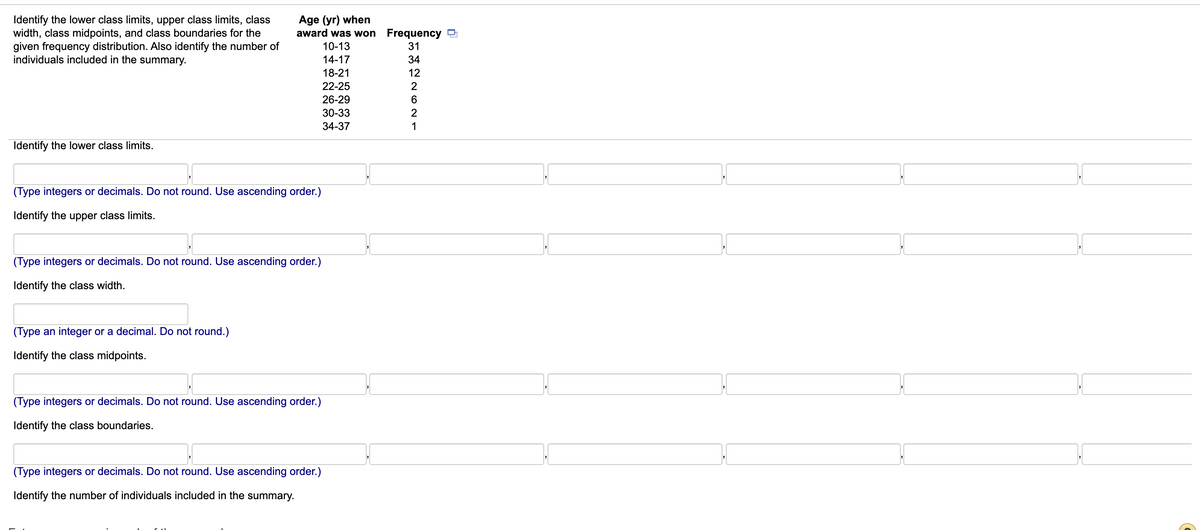Identify the lower class limits, upper class limits, class width, class midpoints, and class boundaries for the given frequency distribution. Also identify the number of individuals included in the summary. Age (yr) when award was won Frequency 10-13 31 14-17 34 12 18-21 22-25 26-29 30-33 2 6. 34-37 1 Identify the lower class limits. (Type integers or decimals. Do not round. Use ascending order.) Identify the upper class limits. (Type integers or decimals. Do not round. Use ascending order.) Identify the class width.
Identify the lower class limits, upper class limits, class width, class midpoints, and class boundaries for the given frequency distribution. Also identify the number of individuals included in the summary. Age (yr) when award was won Frequency 10-13 31 14-17 34 12 18-21 22-25 26-29 30-33 2 6. 34-37 1 Identify the lower class limits. (Type integers or decimals. Do not round. Use ascending order.) Identify the upper class limits. (Type integers or decimals. Do not round. Use ascending order.) Identify the class width.
Big Ideas Math A Bridge To Success Algebra 1: Student Edition 2015
1st Edition
ISBN:9781680331141
Author:HOUGHTON MIFFLIN HARCOURT
Publisher:HOUGHTON MIFFLIN HARCOURT
Chapter11: Data Analysis And Displays
Section: Chapter Questions
Problem 10CT
Related questions
Concept explainers
Contingency Table
A contingency table can be defined as the visual representation of the relationship between two or more categorical variables that can be evaluated and registered. It is a categorical version of the scatterplot, which is used to investigate the linear relationship between two variables. A contingency table is indeed a type of frequency distribution table that displays two variables at the same time.
Binomial Distribution
Binomial is an algebraic expression of the sum or the difference of two terms. Before knowing about binomial distribution, we must know about the binomial theorem.
Topic Video
Question
4

Transcribed Image Text:Age (yr) when
award was won Frequency 9
Identify the lower class limits, upper class limits, class
width, class midpoints, and class boundaries for the
given frequency distribution. Also identify the number of
individuals included in the summary.
10-13
14-17
34
18-21
22-25
26-29
30-33
34-37
Identify the lower class limits.
(Type integers or decimals. Do not round. Use ascending order.)
Identify the upper class limits.
(Type integers or decimals. Do not round. Use ascending order.)
Identify the class width.
(Type an integer or a decimal. Do not round.)
Identify the class midpoints.
(Type integers or decimals. Do not round. Use ascending order.)
Identify the class boundaries.
(Type integers or decimals. Do not round. Use ascending order.)
Identify the number of individuals included in the summary.
에외262 1
Expert Solution
This question has been solved!
Explore an expertly crafted, step-by-step solution for a thorough understanding of key concepts.
This is a popular solution!
Trending now
This is a popular solution!
Step by step
Solved in 3 steps with 1 images

Knowledge Booster
Learn more about
Need a deep-dive on the concept behind this application? Look no further. Learn more about this topic, statistics and related others by exploring similar questions and additional content below.Recommended textbooks for you

Big Ideas Math A Bridge To Success Algebra 1: Stu…
Algebra
ISBN:
9781680331141
Author:
HOUGHTON MIFFLIN HARCOURT
Publisher:
Houghton Mifflin Harcourt

Glencoe Algebra 1, Student Edition, 9780079039897…
Algebra
ISBN:
9780079039897
Author:
Carter
Publisher:
McGraw Hill

Big Ideas Math A Bridge To Success Algebra 1: Stu…
Algebra
ISBN:
9781680331141
Author:
HOUGHTON MIFFLIN HARCOURT
Publisher:
Houghton Mifflin Harcourt

Glencoe Algebra 1, Student Edition, 9780079039897…
Algebra
ISBN:
9780079039897
Author:
Carter
Publisher:
McGraw Hill